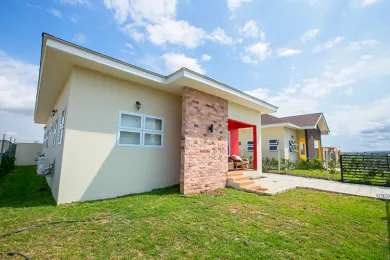Cedi or Dollar; the dilemma of getting a home loan in Ghana
Once a homebuyer settles on their dream property, the next decision relates to the choice of currency to finance their purchase – GHS or USD?
Generally, the obvious preference is to borrow in the currency of your income. In other words, if you are paid in cedis, take a cedi denominated loan. Conversely, if you earn foreign currency, then choose a USD loan.
Cedi loans are benchmarked to the Ghana Reference Rate (GRR), this is set by Bank of Ghana and reflects local market rates. In contrast, dollar loans are pegged to benchmarks such as LIBOR and US Government bonds. While GRR is currently c.23.7%, key USD benchmarks are typically well under 8%. A credit margin is added to either benchmark to determine the final rate a borrower is charged.
I’ve taken some time to demonstrate in the case study below what the choice of currency means for two friends each borrowing USD40,000 to buy a USD50,000 property.
| 1USD = GHS8 | USD loan | GHS loan |
| Applicant A | Applicant B | |
| House Price | 50,000 | 400,000 |
| Loan amount (8o% Loan To Value) | 40,000 | 320,000 |
| Interest rate (benchmark plus margin) | 12.5% | 28% |
| Monthly repayment | $454.46(GHS 3,635.68) | GHS 7,496.23 |
| Qualifying Salary (GHS equivalent) | 9,089.12 | 18,740.57 |
| Tenor | 20 years | 20 years |
To qualify for the same loan in cedis, Applicant B must demonstrate monthly income of GHS18,740, double what Applicant A is expected to provide. Again, each month Applicant B pays GHS7,496, over twice what Applicant A pays towards loan servicing.
Applicant B may endure the pain of this expensive cedi loan because they are concerned about the possibility of depreciation. The expectation is that depreciation would certainly result in the USD borrower paying more each month.
The table below shows what would happen to either applicant if the cedi were to suffer an extreme depreciation, to say GHS16 to USD1.
| 1USD = GHS16 | USD | GHS |
| Applicant A | Applicant B | |
| House Price | 50,000 | 400,000 |
| Loan amount (8o% Loan To Value) | 40,000 | 320,000 |
| Interest rate | 12.5% | 28% |
| Monthly repayment (GHS equivalent) | $454.46 (GHS7,271.30) | 7,496.23 |
| Qualifying Salary (GHS equivalent) | 18,178.25 | 18,740.57 |
| Tenor | 20years | 20 years |
While the USD monthly repayment has not changed, the dramatic depreciation of the cedi from 8 to 16 would double the cedi equivalent of that same amount. Applicant A now pays GHS 7,271, significantly more than the GHS3,635 they paid earlier, even though surprisingly still less than what Applicant B pays.
Most economists agree that such a severe depreciation in the cedi value would result in local interest rates being revised upwards to address the situation.
The table below shows a more likely state of the world where the cedi is heavily depreciated and local interest rates have shot up to help stabilise the currency.
| USD1=GHS16 | USD | GHS |
| Applicant A | Applicant B | |
| House Price | 50,000 | 400,000 |
| Loan amount | 40,000 | 320,000 |
| Interest rate | 13% | 35% |
| Monthly repayment (GHS equivalent) | $468.63(GHS7,498.08) | 9,342.75 |
| Qualifying Salary (GHS equivalent) | 18,745.21 | 23,356.88 |
| Tenor | 20 years | 20 years |
The benchmark GRR would be revised upwards to support the weakening cedi, resulting in local rates going up to possibly c.35% or even higher. Again, USD borrower is better off when compared to his cedi counterpart whose monthly repayment is now increased to GHS9,342.
It would take a massive depreciation of the cedi, well over 100% in this case, with an accompanying freeze in local rates, to bring both borrowers to parity in terms of monthly repayment amounts.
I strongly believe that while the decision is simple for a USD earner, it is not that straightforward for a local currency applicant. When it comes to long term borrowing, cedi earners are presented with a difficult choice between interest rate risk and foreign exchange volatility.
If you are a prospective home buyer, then you should carefully analyse your options and seek advice from experts within the home financing or mortgage industry.
By Norvan Acquah-Hayford.
The writer is the managing editor for norvanreports.com and if you have any comments, please send him an email to norvan986@gmail.com









I am a mortgage payment person and I am having practical experience of your write up.
Thanks so much. It is not easy for some of us at all